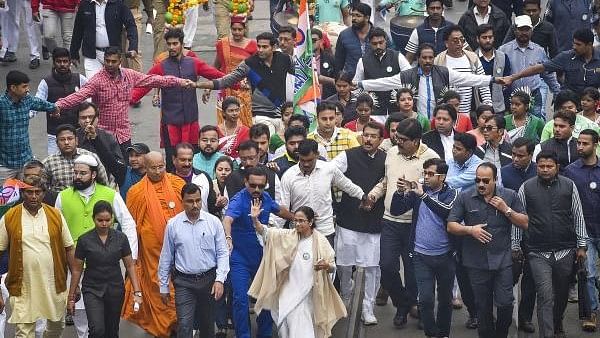
Back in December 2019, when the Citizenship (Amendment) Act was passed, West Bengal Chief Minister Mamata Banerjee lead a rally of thousands of partymen, vowing never to allow the law to be implemented in West Bengal.
Credit: PTI File Photo
Kolkata: The implementation of the CAA by the Centre just ahead of the Lok Sabha polls is anticipated to intensify communal polarization, significantly influencing the electoral discourse in West Bengal with both the opposition BJP and the ruling TMC poised to reap political dividend out of it.
The CAA, enacted by Parliament in 2019, aims to expedite citizenship for undocumented non-Muslim migrants from Pakistan, Bangladesh, and Afghanistan who arrived in India before December 31, 2014. With the recent notification of the rules, persecuted non-Muslim migrants—Hindus, Sikhs, Jains, Buddhists, Parsis, and Christians—from these nations are now eligible for Indian nationality.
The Bengal BJP views the CAA as a pivotal issue in the upcoming polls, particularly in Matua-dominated constituencies, foreseeing an advantageous position for the party.
Conversely, TMC leaders acknowledge the CAA's potential to shape the electoral narrative but intend to leverage it to highlight their stance against the BJP's perceived 'anti-Bengali' sentiments.
Political analysts suggest that the CAA's impact could be significant, particularly in 12-15 constituencies, including those with Matua and minority influences in North and South Bengal by triggering consolidation and counter-consolidation of voters.
There was demand for the NRC to weed infiltrators from Bengal, which shares an over 2000 km-long border with Bangladesh. Implementation of the CAA has been a major poll plank of the saffron camp in the 2019 Lok Sabha polls and it yielded positive results as BJP increased its tally from two to 18 seats in the state.
On Monday, West Bengal Chief Minister Mamata Banerjee stated she would strongly oppose the Citizenship Amendment Act (CAA) if it discriminates against certain groups in India or restricts their citizenship rights in any way, expressing concerns that it might pave the way for a nationwide implementation of the National Register of Citizens (NRC), “We will oppose NRC implementation at all costs. I am only worried as to whether the new CAA rules would make the previous entitlements of our citizens invalid. Will the documents they hold lose value now?” the TMC chief said.
Observers note that while the CAA might bolster the BJP's prospects in certain constituencies, it could trigger a counter-reaction, especially among minority groups.
TMC insiders anticipate leveraging the CAA to consolidate minority votes and reinforce the narrative of the BJP's alleged hostility towards Bengalis.
According to political observers, the issue of CAA although will have an impact on Matua-dominated seats such as Bongaon, Ranaghat, presently with the BJP, and Krishnanagar and parts of refugees-dominated seats, will have a counter impact in minority-dominated seats of the South Bengal and also in North Bengal, where the BJP had swept in 2019.
The TMC perceives a connection between the implementation of the CAA and recent Aadhaar card cancellations in parts of the state, viewing them as precursors to a potential implementation of the NRC in Bengal.
A TMC leader explained, 'The CAA's implementation will not only strengthen support from minority communities but also resonate with certain segments of the Bengali elite who have criticized us for corruption issues and marginalized sections who lack proper documentation.' Moreover, TMC leaders cite the aftermath of the final NRC list publication in Assam in August 2019 as a strategic turning point. They emphasize how the exclusion of a significant number of individuals, including Hindus and Bengali Hindus, helped the TMC shape the political narrative in its favour.
By painting the BJP as 'anti-Bengali,' the TMC claims to have successfully countered the BJP's electoral gains, particularly in the 2019 Lok Sabha polls.
A TMC leader, speaking anonymously, asserted, "Our campaigns against the CAA and NRC played a crucial role, ultimately leading to the BJP's defeat in the subsequent assembly polls."
The BJP, however, feels that it will not only be endeared to the refugee community of the state, especially the Matuas, but it will also help in the consolidation of the majority votes.
“We are hopeful that the refugee community and a large section of Hindus whose past generations had to migrate due to religious persecution would understand the ground reality,” BJP state spokesperson Samik Bhattacharya said.
Union Minister and leader of the Matua community, Shantanu Thakur thinks that the Matuas would en bloc vote for the BJP, following the fulfilment of its promises.
“Implementation of CAA will have a direct impact in at least 10-12 constituencies and we are confident of winning all the Matuas and refugee community-dominated seats,” he said.
The Matua community anticipated to reap the most benefits from the implementation of the CAA, had dubbed it as their “second independence day.”
The Matuas, a significant portion of the state's Scheduled Caste population, have been migrating to West Bengal since the 1950s, fleeing religious persecution in East Pakistan, now Bangladesh, Since the '90s, political parties have courted the support of the Matuas, whose substantial population and tendency to vote cohesively render them a valuable voting bloc akin to minority groups, particularly in alignment with the BJP's stance on the CAA.
The CPI(M), however, feels that the CAA is a ploy ahead of the Lok Sabha elections to polarize the electorate ahead of the Lok Sabha elections.
Political scientist Sabyasachi Basu Roy Chowdhury said the spectre of CAA implementation will further trigger fears of the implementation of NRC, which is an obvious conclusion.
“The implementation of CAA does not necessarily benefit BJP as it might trigger paranoia over a possible follow-up with NRC, which had triggered fears among the minorities and also a section of the Hindu community. Indians are never thorough about documentation,” he said.
Political observer Suman Bhattacharya said, “The implementation of the CAA will trigger both polarisation of the Matuas and refugees and counter polarisation of the minorities, with BJP and the TMC both benefitting out of it,” he said.